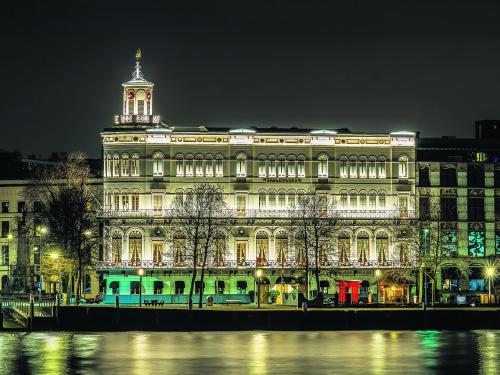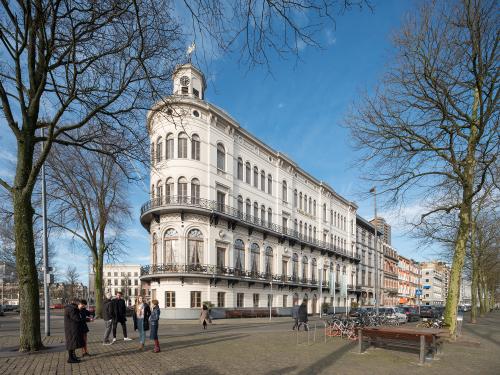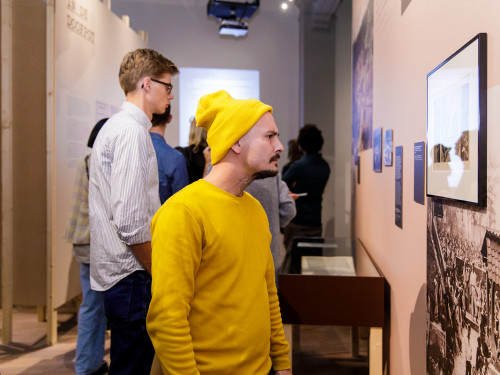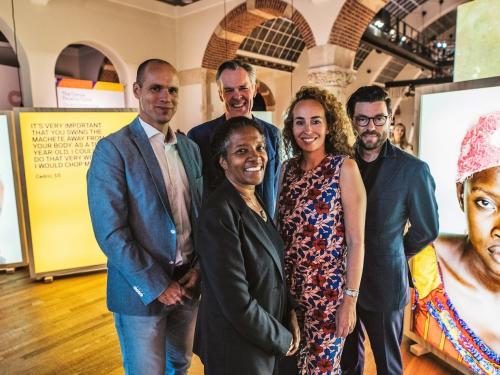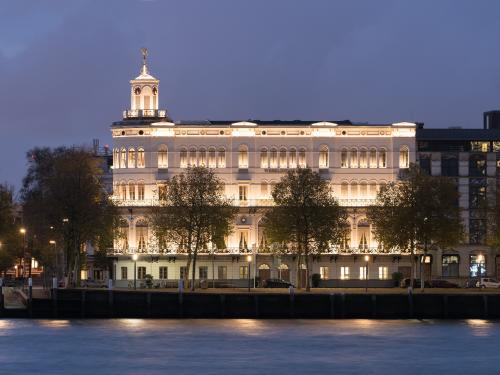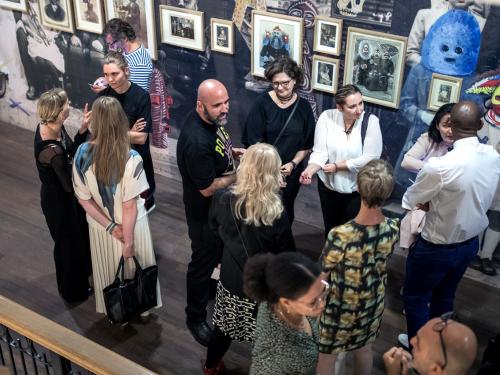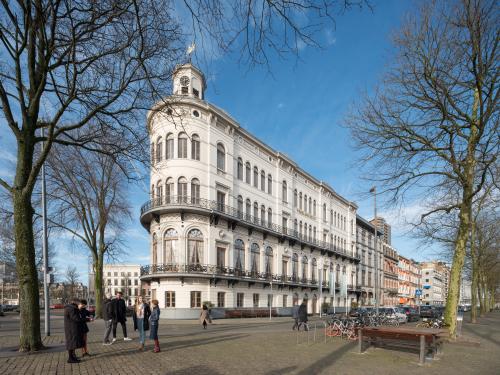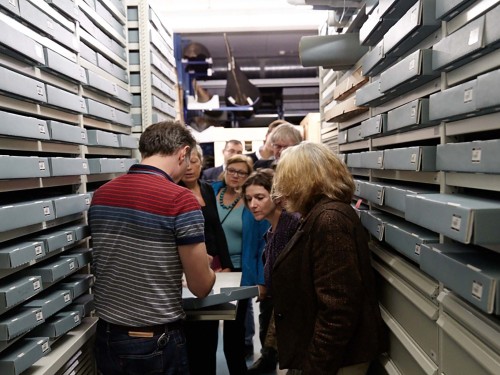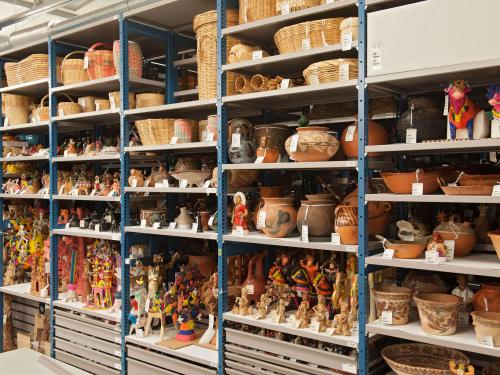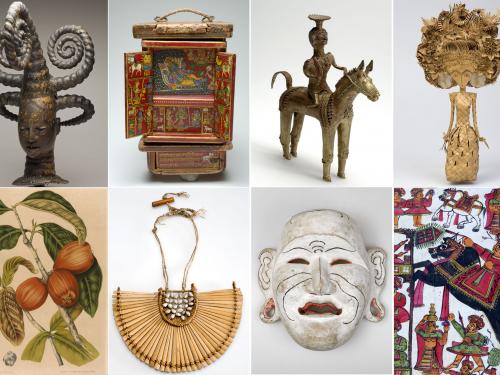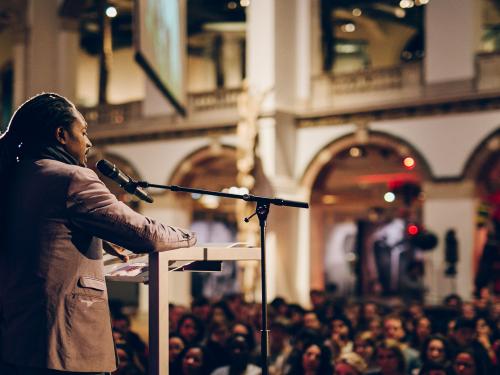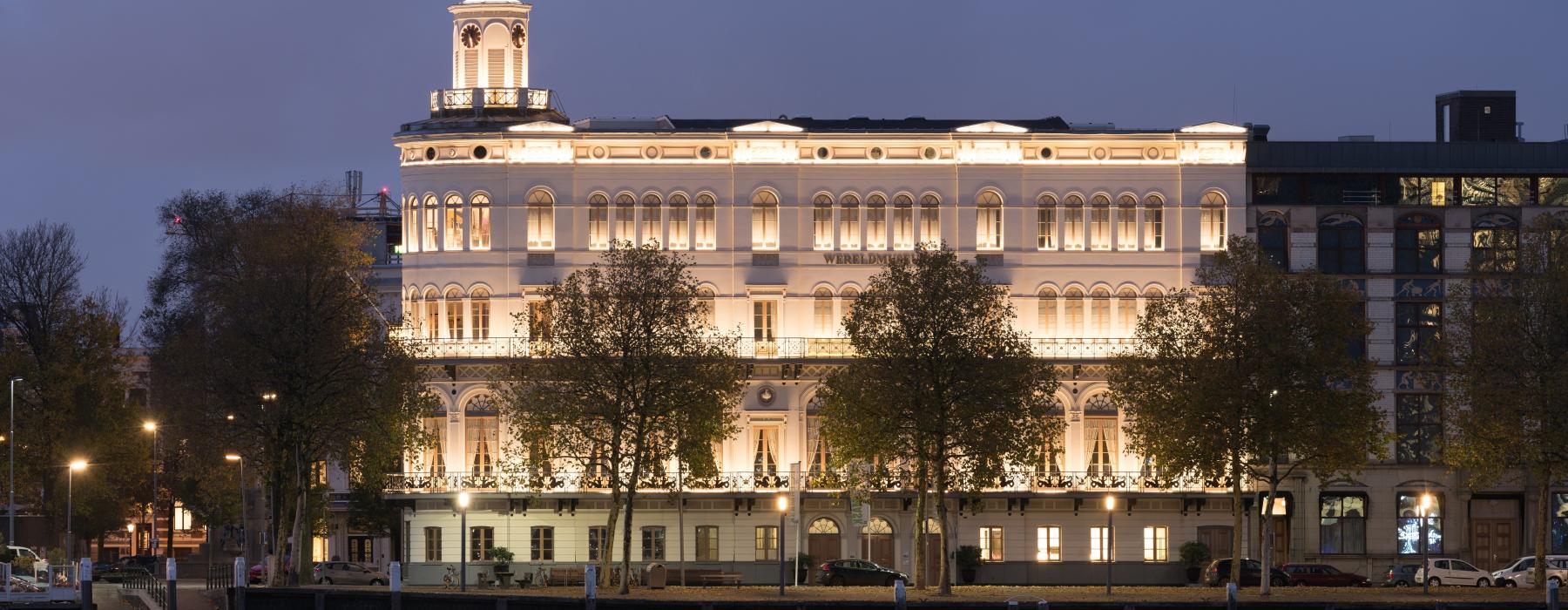
General terms and conditions: definitions
Article 1.1 The Wereldmuseum (Wereldmuseum Rotterdam) refers to the organisation responsible for managing and running the museum and includes, but is not limited to, the management board, staff and other Wereldmuseum functionaries authorised to act on the Werelmuseum’s behalf.
Article 1.2 The museum is taken to refer to the entire complex of areas (built up or otherwise) falling under the legal or managerial authority of the Wereldmuseum management.
Article 1.3 A visitor is defined as anyone who in any way, whether directly or indirectly, with or without payment, enters into an undertaking with the Wereldmuseum with the aim gaining entry to the museum and/or visiting an exhibition and/or attending an activity organised by the Wereldmuseum.
Article 1.4 Workers and functionaries are defined as all those engaged by the Wereldmuseum (in a voluntary capacity or otherwise). Staff and functionaries are identifiable by their uniform, a staff pass bearing their name or the wearing of a name tag.
Article 1.5 These Visitor General Terms and Conditions pertain to every agreement entered into by a visitor with the Wereldmuseum. The terms and conditions do not apply to special activities outside regular opening hours, as when venues are rented out for the exclusive use of private parties, catering and suchlike.
Ticket sales, special offers and prices
Article 2.1 All price estimates, announcements or other information disseminated by the Wereldmuseum are not without obligation. The Museum accepts liability for possible errors it might have made in prices quoted to visitors, announcements or other information supplied. This liability is limited to quoted prices, information leaflets and other material present on the Wereldmuseum premises at the time of a claim, and to such materials as have recently been disseminated by the Wereldmuseum or on its behalf. The Wereldmuseum is not liable for mistakes occasioned by third parties, whether through commission, fault or omission.
Article 2.2 Visitors are required at all times to show their tickets and any cards of vouchers entitling them to a discount on the entry fee if requested to do by someone who is recognisably a member of the museum staff or functionary.
Article 2.3 Potential visitors are not entitled to restitution of the entrance fee or any other reimbursement in the event of loss or theft of an entry ticket prior to entering the museum. Failure to make use of a previously purchased ticket is for the potential visitor’s own account; this is also the case when entry tickets are only valid for a particular time slot and/or date. Once purchased, a ticket may not be exchanged, nor will the entry fee be refunded. In exceptional cases an entry fee that has been paid may be refunded should circumstances beyond the control of the purchaser prevent them from visiting the museum. Such refunds are however at the management’s discretion.
Article 2.4 Potential visitors may be refused entry to the museum under the following circumstances: - the entry ticket, discount card or voucher has not been purchased from the Wereldmuseum or an institution authorized by it; - the visitor is evidently under the influence of alcohol, drugs or related substances - the visitor is disrupting the public order or evidently has the intention of doing so; - the visitor evidently refuses to conform to the Wereldmuseum’s house rules, parking requirements, instructions, guidelines or rules of interaction; - the visitor intends entering the premises while partly clothed (for example in bare feet and/or shirtless/topless) - the visitor is wearing clothing and/or footwear that could damage the museum’s interior and/or collection; - the visitor is in possession of legally prohibited or dangerous goods, materials or objects, such as fireworks, glasses, cans, banners or posters deemed by Wereldmuseum staff to bear discriminatory or provocative slogans, chains, firearms, thrust weapons, knives, blunt objects or any other objects that may be used as weapons to disrupt the public order or to endanger the safety of other visitors, the buildings or collections.
Article 2.5 The Wereldmuseum will refund any entry fees that have been paid by the visitor in the event of visitors being required to leave the building prematurely due to an unannounced drill for safety purposes (article 23 of the Dutch Occupational Health and Safety Act) or in the event of an actual emergency requiring the partial or complete evacuation of the museum premises. In cases where the visit to the museum premises can be resumed immediately after such a drill, the Wereldmuseum will not issue a refund.
Article 2.6 Visitors paying with a credit card will have their card debited immediately at time of payment.
Stay in and around the Museum
Article 3.1 During their visit to the museum and its environs, visitors will be deemed to keep the peace, to observe public morals and to behave with a propriety in keeping with the nature of the activity in which they are participating. Visitors are further required to adhere promptly to any instructions given by members of staff who are identifiable as such. If, in the reasonable opinion of an authorized, clearly identifiable member of staff, a visitor fails to act in accordance with such norms, indications or instructions, he or she may be refused further entry to the museum without any right to restitution of the costs of entry or any other costs that may have been incurred. With regard to the latter, visitors already on the premises may be evicted by a member of staff and/or transferred into police custody. In such cases the visitor’s ticket immediately and irreversibly loses all validity.
Article 3.2 Parents or supervising adults are at all times responsible and accountable for the behaviour of the children in their charge. Teachers and adults supervising groups are responsible and can be held to account for the behaviour of group members in their charge.
Article 3.3 Visitors to the museum and around the museum are prohibited from: a. offering goods of any kind to third parties whether for sale or free of charge b. purposely and protractedly obstructing access for other visitors and/or obscuring the exhibits from view and/or sitting on the ground c. using cameras and/or film or video cameras, mobile phones, iPods or other sound sources; however, the use of such apparatus may be explicitly permitted in some areas outside the display galleries d. taking pets or other animals with them into the museum, except in those cases where these are explicitly permitted in certain areas or when the animal in question is a guide dog accompanying a visitor in possession of the appropriate identification e. smoking f. taking food and or drinks into the museum buildings g. carrying what may be deemed by an identifiable member of staff to be dangerous objects or substances such as (but not limited to) walking sticks with a sharp point, umbrellas or large bags. These may be stowed in the cloakroom lockers intended for this purpose h. making use of private modes of transport, with the exception of wheelchairs, prams and buggies, walking frames and other generally accepted mobility aids i. Touching the objects on display or museum accoutrements and furniture such as display cases, demarcation poles and cords, lighting, partitions and suchlike, unless this is expressly permitted. Parents or supervising adults must ensure that the children in their charge do not touch the objects on display; in the same way teachers and supervisors of group visits are required to ensure that members of the groups in their charge do not touch the exhibits. Small children may not be carried on the shoulders of an accompanying adult but must be carried in their arms or held by the hand j. taking drinks or other liquids into the museum, whether tinned, bottled or in another form of packaging k. giving tours of the museum l. offering or developing commercial or non-commercial activities on the premises without the explicit prior permission of the Wereldmuseum.
Article 3.4 The Wereldmuseum reserves the right to bar a visitor from the museum permanently or for a stipulated period if during a previous visit or several previous visits to a Dutch museum they have expressly damaged an object or given the museum reason to believe that they might do so. The museum further reserves the right at all times to subject such visitor to the measures outlined under article 4.5 of these terms and conditions. The decision to bar a visitor from the museum and on what grounds, must be conveyed to them forthwith by the museum’s management, where possible in writing.
Article 3.5 In unusual circumstances as may be demanded in the interests of people’s general safety or that of the collection, a senior member of the Wereldmuseum’s staff – who must be identifiable as such – can ask to inspect a visitor’s bag or hand baggage.
Article 3.6 In case of an emergency, such as the sudden disappearance of a collection piece, a terrorist attack, natural disaster or any other kind of disaster, the Wereldmuseum has the right to seal all entrances and exits and escort visitors outside one by one. Visitors may be asked to cooperate with a search of their bags and other possessions by, or on behalf of, Wereldmuseum staff. Those visitors who refuse to comply with a request to submit to a search will be requested to submit proof of identification before leaving the museum premises.
Article 3.7 The Wereldmuseum operates video surveillance. Visitors are deemed to have agreed that they may be recorded on video. Potential visitors are informed prior to entering the premises that video surveillance is operative. Camera footage is retained for a period of time determined by the Wereldmuseum and may be handed over to the police should circumstances demand.
Article 3.8 Taking photographs, film and video recordings is not permitted without the prior written permission of the museum’s management or the Wereldmuseum’s PR & Marketing department. Furthermore, the publication, distribution or reproduction of video and film footage recorded on museum premises, in whatever manner and regardless of the medium including electronic media, is expressly forbidden without the prior written permission the Wereldmuseum management. Nor may the aforementioned photographs, film or video footage be deployed for commercial purposes without prior permission in writing from the Wereldmuseum management. Professional or semi-profession photographic reportage is not permitted, including for study purposes or wedding sequences.
Complaints and claims
Article 4.1 The Wereldmuseum will make every effort to ensure that visits to the museum and exhibitions and activities organised by the Wereldmuseum are conducted as advertised; this includes the obligation to inform the public as fully as possible about any closures, partial closures or early closing of the museum and/or exhibitions and activities organised by the Wereldmuseum. Wereldmuseum will further inform the public about any maintenance work, refurbishments or restoration work in the galleries that are likely to cause inconvenience. Visitors cannot claim damages on these grounds.
Article 4.2 Claims may not be lodged with regard to the following unavoidable circumstances and complaints and therefore cannot ever result in any liability for restitution to visitors by the Wereldmuseum:
a. Complaints pertaining to the failure to display objects from the permanent collection of the Wereldmuseum; b. Complaints pertaining to the partial closure of the Wereldmuseum, including (but not limited to) the closure of some galleries while an exhibition, activity or event is being set up or dismantled; c. Complaints and circumstances related to excessive noise occasioned by the setting up or dismantling of an exhibition or event d. Complaints and circumstances related to hindrance or inconvenience from maintenance work, including (but not limited to) that occasioned by the use of technical apparatus (lawnmowers, leaf-blowers, drills, walkie-talkies etc) by staff during the course of their work; e. Complaints and circumstances relating to inconvenience or hindrance caused by some Wereldmuseum facilities not functioning properly; f. Complaints and circumstances pertaining to inconvenience or hindrance experienced as a result of other visitors, including (but not limited to) excessive noise, inappropriate behaviour, theft and harassment/molestation.
Article 4.3 Complaints and requests for restitution pertaining to the agreement between the Wereldmuseum and its visitors should be lodged with the Wereldmuseum in writing within a period of six weeks after the visit in question having taken place. Complaints and requests for a refund submitted after expiration of this period will not be processed.
Article 4.4 The Wereldmuseum undertakes to investigate the complaint and answer in writing within thirty days of said complaint having been received. Should the investigation of the complaint not yet be complete, then this will be communicated to the complainant, together with an estimate of when the investigation is likely to be completed.
Liability
Article 5.1 The museum cannot be held liable for damages arising from price estimates, notifications or other communications to visitors by the Wereldmuseum and/or third parties except in those cases and insofar as such damages result directly from intent or gross negligence on the part of the Wereldmuseum and/or its staff.
Article 5.2 The visitor’s stay on the Wereldmuseum premises and its environs is at their own risk and for their own account. The Wereldmuseum may only be held liable for material and/or consequential losses suffered by the visitor or injuries suffered by them that can be shown to result directly and exclusively from intent or gross negligence on the part of the Wereldmuseum, subject to the condition that the only damages liable for restitution are those against which the museum is insured or may reasonably and fairly deemed to be insured.
Article 5.3 Under no circumstances can the Wereldmuseum be held to pay a higher amount in damages than: a. the amount in entrance fee actually paid, or in the even that it is higher: b. the amount paid concerning the damages to the Wereldmuseum by the Wereldmuseum’s insurer, or: c. the compensation obtained from a third party concerning the damages.
Article 5.4 The Wereldmuseum can never be held liable for any damage to a visitor’s vehicle except and insofar the damage was sustained on the Wereldmuseum premises and is the direct result of intent or gross negligence on the part of the Wereldmuseum and/or its members of staff.
Article 5.5 The Wereldmuseum can never be held liable for any direct or indirect damage whatsoever that may have arisen directly or indirectly as a result of any shortcoming or any circumstance or in any capacity to any real estate or property of which the Wereldmuseum is the holder, leaseholder, tenant or owner, or any such property that is otherwise at the Wereldmuseum’s disposal, except in cases where, and insofar as, the damage follows directly from intent or gross negligence on the part of the Wereldmuseum and/or members of its staff.
Article 5.6 If the Wereldmuseum receives items or goods, or if goods are deposited, stored and/or left in whatever way and wherever by whomsoever (for example in the cloakroom lockers) without the Wereldmuseum having demanded remuneration in this regard, then the Wereldmuseum can never be held liable for damages to or in connection with such goods, regardless of the way these may have been occasioned, unless the Wereldmuseum purposely caused such damage or such damage is the direct result of gross negligence on the part of the Wereldmuseum.
Article 5.6.1 This article also applies to goods or items that have been left in the cloakroom. The Wereldmuseum is not liable for damage to, or possible theft of or from, clothing bags or other goods that have been left.
Article 5.7 The total liability of the Wereldmuseum due to attributable shortcomings in complying with the visitor agreement is limited to the restitution of direct damages and shall under no circumstances exceed that specified in the compensation arrangements outlined under article 5.3.
Article 5.8 In the event of damages resulting from death or physical injury, the total liability of the Wereldmuseum shall under no circumstances exceed that which is specified under article 5.3.
Article 5.9 The Wereldmuseum is in no way liable for indirect damages, including consequential damages, loss of income or earnings, lost savings etcetera.
Force majeure
Article 6.1 Force majeure, which means that the Wereldmuseum cannot be held responsible for any resultant shortcomings, is defined as any unforeseen circumstance that so impedes the Wereldmuseum’s ability to meet the terms of the visitor agreement that implementation becomes troublesome or impossible, either temporarily or permanently.
Article 6.2 Such circumstances are taken to include circumstances with regard to people and/or services and/or institutions deployed by the museum in the execution of the visitor agreement as well as everything that may be said to constitute force majeure, or grounds for suspension or dissolution for the aforementioned parties, as well as shortcomings for which aforementioned parties are themselves at fault.
Lost and found
Article 7.1 Items found by visitors near or on the Wereldmuseum premises can be handed in at the cash desk
Article 7.2 The Wereldmuseum will make every effort to find the owner or rightful claimant of the lost item and to return the item to them. Should the owner or rightful claimant have failed to make enquiries within 14 days, or should the Wereldmuseum have failed to trace the owner or rightful claimant within 14 days, then the item will be destroyed. Passports and driving licences will be handed over to the police without delay.
Article 7.3 In cases where the owner or rightful claimant applies to the Wereldmuseum, they will be given the option of picking up the goods in person or having them sent against cash on delivery. In both cases the owner or rightful claimant must show proof of identity. The Wereldmuseum cannot be held liable in the event of the possible theft or loss of goods that have been despatched.
Other terms and conditions
Article 8.1 The applicability of these visitor terms and conditions in no way affects the validity of any other Wereldmuseum (contractual) conditions and/or regulations.
Article 8.2 In addition to – but not as a substitute for – these visitor terms and conditions, the Wereldmuseum’s house rules apply.
Applicable law
Article 9.1 These visitor terms and conditions and the undertaking between the visitor and the Wereldmuseum are subject to Dutch law.
Article 9.2 All disputes arising from the undertaking between the visitor and the Wereldmuseum will be exclusively submitted to the competent court for adjudication.
